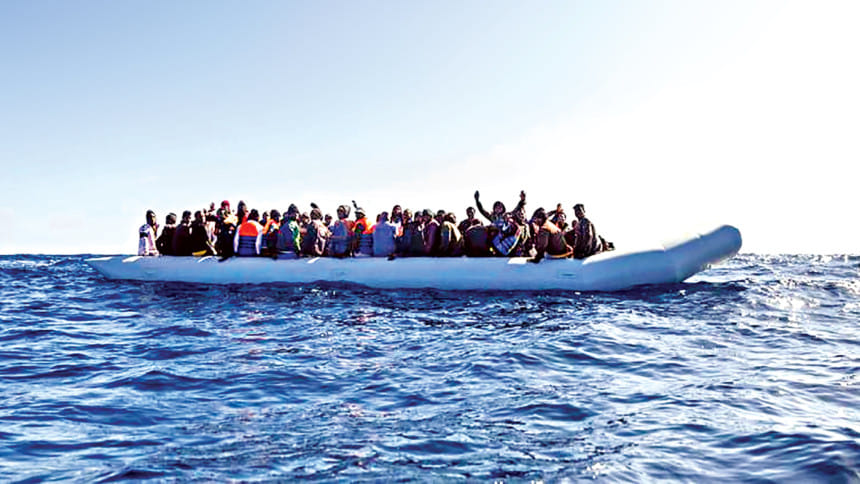Illegal migration to Europe spikes

Illegal migration of Bangladeshis to Europe through various Mediterranean routes saw an upsurge this year, raising concerns over the government measures to control it effectively.
In the first eight months of the year, 10,376 illegal border crossings by Bangladeshis on five Mediterranean routes were detected, according to Frontex, the European border and coast guard agency. In 2021, 8,523 such illegal border crossings by Bangladeshis took place.
Between 2017 and 2021, 26,820 illegal border crossings by Bangladeshis on the five Mediterranean routes were detected, meaning 5,364 crossings take place on average in a year.
Frontex data represent detections of illegal border crossing rather than the number of persons, as the same person may cross the external border more than once.
Of the illegal border crossings as of August, 89 percent were made on the Central Mediterranean Sea route alone, which falls between Libya and Italy.
Last year, Bangladeshis made 7,848 illegal border crossings on the Central Mediterranean Sea route.
The four other routes are the Eastern Mediterranean sea and land routes and the Western Mediterranean sea and land routes.
Between January last year and November this year, the UN Refugee Agency in its Mediterranean situation report said 20,700 Bangladeshi nationals arrived in Europe, which is the third highest after Tunisians and Egyptians.
While these individuals made it to Europe, many do not survive the dangerous journey.
Between January 2014 and September this year, at least 155 deaths of Bangladeshis on their way to Europe were recorded by the International Organisation for Migration (IOM) under its "Missing Migrants Project". The tally is the 13th highest during the period.
The number of Bangladeshis could be more as more than 17,000 people who lost their lives en route to Europe between 2014 and 2021 are listed without any information on country of origin, said a new report of the project published in October.
"It will be difficult to curb such illegal migration of Bangladeshis if they are not made aware of the risks of the journey," said Shariful Hasan, head of the Brac Migration Programme.
Mainly people from eight to 10 districts across Dhaka, Faridpur and Sylhet migrate to Europe illegally.
"It should be built into their psyche that such illegal journey involves various risks including death and arrest while it also tarnishes the country's image as a whole," he added.
Instances of punishing traffickers in Bangladesh are few and far between, said Shakirul Islam, chairperson of Ovibashi Karmi Unnayan Programme, adding that the government needs to show "zero tolerance" in this regard.
A legal pathway of migration can effectively reduce illegal migration and the Bangladesh government need to put more focus on creating such opportunities, he said.
At present, different European countries hire foreign workers under a "talent partnership" initiative.
"Bangladesh needs to explore this opportunity," Islam said.
So far, Bangladesh has inked a memorandum of understanding in February with Greece, one of the 27 member states of the EU.
Under the arrangement, Greece will hire 4,000 workers from Bangladesh each year.
The recruitment process has not started yet, according to an official of the Bangladesh embassy in Athens.
Besides, Italy, another EU country, will hire a small number of "seasonal" workers from Bangladesh each year.

 For all latest news, follow The Daily Star's Google News channel.
For all latest news, follow The Daily Star's Google News channel. 








Comments